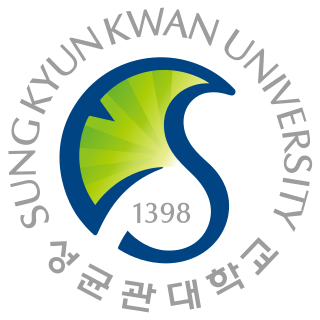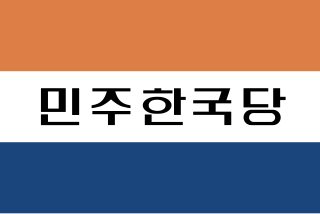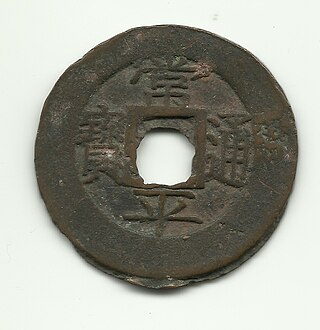There are various names of Korea in use today that are all derived from those of ancient Koreanic kingdoms and dynasties. The choice of name often depends on the language,whether the user is referring to either or both modern Korean countries,and even the user's political views on the Korean conflict.

Sungkyunkwan University is a private research university with campuses in Seoul and Suwon,South Korea.
Hankook Ilbo is a Korean-language daily newspaper in Seoul,South Korea. As of 2017,it had a daily circulation of about 213,200.

Hong Jin,also known as Hong Myeon-hui,was a leader of the Korean independence movement. He is also sometimes known by his art name Mano,and his Christian name,Andre.

The Democratic Justice Party was the ruling party of South Korea from 1981 to 1988.
Korean History Compilation Committee was established in June 1925 by the Japanese government. It is also known as Korean History Compilation Society,Association of the Compilation of Korean History,Korean History Compilation Bureau or Society of Compiling Korean History.
The Korean Archaeological Society is a professional and scholarly association of archaeologists in South Korea. The Society publishes the peer-reviewed Journal of the Korean Archaeological Society. This journal is the South Korean equivalent of scholarly archaeological journals such as American Antiquity,Kaogu,Antiquity,and Kokogaku Kenkyu. The Society also hosts a national conference every year in early November.
Koguryŏpigi is a theorized Korean prophetic book that predicted the downfall of the Korean state Goguryeo. The book is attested to in other records,although it is some uncertainty that it exists. Its contents are mostly unknown;all that is known of it is that it predicted Goguryeo's downfall within a 900 years by an 80-year-old military commander.

The Korean Studies Institute was founded in 1995 as a non-profit foundation under the affiliation of the Ministry of Culture,Sports and Tourism. Located in Andong,it conducts research,conservation,collection and studies on Korean archives owned by private individuals which were at risk of loss of damage over time.

The Democratic Korea Party was a political party in South Korea.
Korean International School of Bangkok is a Korean international school in Nongchok,Bangkok,Thailand.

The Dangojeon refers to the 5 mun denomination of the Sangpyeong Tongbo (常平通寶) Korean cash coins introduced in February 1883 following the disastrous introduction of the earlier Dangbaekjeon (當百錢) two decades earlier. The Dangojeon had a nominal value that was five times higher than that of the regular yeopjeon,but its purchasing power was just twice as high,like the previous series of high denomination Sangpyeong Tongbo cash coins,this would prove to be a major cause of inflation and disrupted the Korean economy.

The Joseon Tongbo was an inscription used on Korean cash coins during the Joseon period first from 1423 until 1425 and later again from 1625 until 1633. Initially the attempt to introduce coinage to Korea proved unsuccessful as had been the case when the Goryeo state had attempted to issue its own coinage centuries earlier. But during the second attempt the Korean economy had evolved to become more reliant on trade and the need for coinage began to challenge the prevalence of barter in Korean society. In the year 1633 the Stabilisation Office introduced the Sangpyeong Tongbo cash coins whose popularity would cause the Joseon Tongbo inscription to be phased out.
Queen Hyosa of the Ansan Kim clan was a Goryeo princess as the daughter of King Hyeonjong and Queen Wonhye,also the full younger sister of King Munjong and King Jeonggan who became the third wife of her half brother,King Deokjong. Since they were once came from the same clan,Queen Hyosa became one of the Goryeo queens who followed their maternal clan.
Marquess Hansan,personal name Wang Yun was a Korean Royal Prince as the only son of Seonjong of Goryeo and Princess Wonsin. Around 1094,Wang Yun appointed as Susado along with Wang Yu and Wang Yeong upon King Heonjong's ascension to the throne.
Princess Suknyeong was a Goryeo Royal Princess as the first and oldest daughter of King Gongyang and Royal Consort Sun. In 1390,she received her royal title along with her sisters,married Wang Jib,a descendant of King Jeonggan. However,both of them were executed after Yi Seong-gye established the new dynasty in 1392.
Queen Yongmok of the Yi clan was a Korean queen consort as the third wife of Jeongjong of Goryeo while her sister became Deokjong of Goryeo's fourth wife. As a queen,she lived in Changseong Palace and bore Jeongjong a daughter,Princess Doae.
Queen Seonui of the Chŏngju Yu clan or formally called Grand Queen Mother Seonui,was a Goryeo princess,second daughter of King Taejo and Queen Jeongdeok. She married her half brother,Daejong of Goryeo,giving birth to three sons,and two daughters,Queen Heonae and Queen Heonjeong.
Queen Yongui of the Danju Han clan was a Korean queen consort as the second wife of Jeongjong of Goryeo and his first wife's younger sister.
Korean History is a series of history books about the history of Korea published by the National Institute of Korean History (NIKH). The series was published as 25 volumes from 1973 to 1979.








